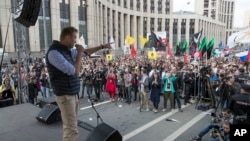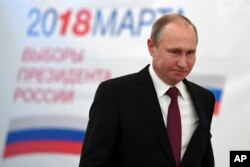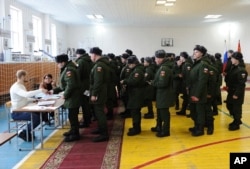Russian police have detained supporters of opposition politician Alexei Navalny, raiding their homes and detaining them on the streets of various Russian cities ahead of Saturday protests against President Vladimir Putin, whose new term starts Monday.
"Activist Ilya Gantvarg was detained in St. Petersburg last night," said an Open Russia Foundation press release reported by Interfax. "Ilya is an active participant in the actions held by Alexei Navalny's staff."
The Open Russia document also says one of its own members, Viktor Chirikov, was detained in Krasnodar, and that an employee of Navalny's staff was detained in her own backyard in Krasnoyarsk.
"She was taken to a court right from home ... tentatively [to be charged] in connection with the May 5 action," the group said.
Navalny's supporters have planned 90 anti-Putin rallies around the country Saturday, some of which have not been approved.
Crackdown warning
In a recent interview with VOA's Russian service, Leonid Volkov, Navalny's chief of staff, warned that a crackdown was imminent.
"The authorities have been and continue to be afraid of protests," he said. "They are trying everything they can — threats, warnings, promises to shatter [the opposition] — it's always the same."
While at least one smaller protest has been sanctioned, Volkov said it was approved largely to project the appearance of direct democracy in action.
"They'll approve and coordinate one protest, something that looks moderately decent," he said, explaining that the one demonstration usually occurs in a secure part of Moscow or St. Petersburg. Smaller cities are more tightly regulated so it doesn't "seem like protests are being dispersed throughout the country."
"It's typical of this fascist police state," he added, explaining that no grass-roots protests have been approved in major cities for at least three years. "Politically speaking, they just can't afford to have a large-scale protest in Moscow.
"I think it's very likely there will be more arrests," he said. "This is part of their routine when it comes to threatening everyone, to try to lower the number of protesters. They do that before every protest — May 5th is no exception."
Navalny office raided
Navalny, who branded Saturday's protest "He's Not Our Tsar," saw his regional headquarters in the Urals city of Yekaterinburg raided early Friday. Police confiscated promotional materials for Saturday's rally.
According to a report by Radio Free Europe, a Navalny organizer in the southern city of Volgograd tweeted that local students were "forced to sign papers acknowledging that they could face serious consequences, including expulsion, if they take part in the rally."
Supporters were also detained in Cheboksary, Kemerovo, Tambov and Ryazan.
All detainees are to face charges of violating regulations for holding public gatherings.
Putin, who has been president or prime minister since 1999, is to be sworn in to a new six-year presidential term on Monday after winning a March 18 election that opponents said was marred by fraud and international observers said gave voters no real choice.
Navalny, who organized massive street protests to coincide with Putin's 2012 re-election, was barred from the presidential ballot because of a conviction on financial crimes charges he contends were fabricated.
Some information in this report came from RFE.






